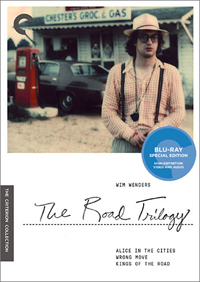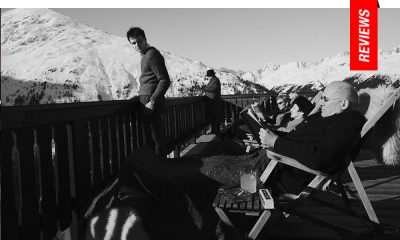Disc Reviews
Criterion Collection: Wim Wenders’ The Road Trilogy | Blu-ray Review
 For the first time ever, Wim Wenders’ famed Road Trilogy, a major cornerstone of the New German Wave, has at last been made available in the US forty years after the premiere of the Kings of the Road (1976), which still stands as one of the auteur’s finest achievements. Although he’d achieve his greatest glories the following decade, winning the Palme d’Or in 1984 for Paris, Texas, and then unleashing 1987’s iconic The Wings of Desire, it was this trio of titles which secured Wenders as a prolific auteur alongside the likes of Fassbinder, Herzog, Schlondorff, Schroeter, and Von Trotta, a generation of filmmakers emerging from disenfranchisement fed by growing national ennui regarding suppressed guilt over horrors of the recent past and an increasingly undetermined future slowly but surely inching towards the end of the Cold War era. Unrest is one of the key motifs across each of these three titles, all anchored by Wenders’ stand-in, Rudiger Vogler as a man struggling valiantly to discover or maintain his artistic integrity despite mounting melancholia and lack of fulfillment. More tonal pieces than ambitious attempts at narrative acrobatics or topical consideration, the time has come to revisit Wenders’ initial early accomplishments in their pristine, restored glory.
For the first time ever, Wim Wenders’ famed Road Trilogy, a major cornerstone of the New German Wave, has at last been made available in the US forty years after the premiere of the Kings of the Road (1976), which still stands as one of the auteur’s finest achievements. Although he’d achieve his greatest glories the following decade, winning the Palme d’Or in 1984 for Paris, Texas, and then unleashing 1987’s iconic The Wings of Desire, it was this trio of titles which secured Wenders as a prolific auteur alongside the likes of Fassbinder, Herzog, Schlondorff, Schroeter, and Von Trotta, a generation of filmmakers emerging from disenfranchisement fed by growing national ennui regarding suppressed guilt over horrors of the recent past and an increasingly undetermined future slowly but surely inching towards the end of the Cold War era. Unrest is one of the key motifs across each of these three titles, all anchored by Wenders’ stand-in, Rudiger Vogler as a man struggling valiantly to discover or maintain his artistic integrity despite mounting melancholia and lack of fulfillment. More tonal pieces than ambitious attempts at narrative acrobatics or topical consideration, the time has come to revisit Wenders’ initial early accomplishments in their pristine, restored glory.
Throughout five decades worth of filmmaking, Wenders has had as many artistic failures as successes, some of his best achievements arriving after switching formats or pursuing new technologies. He achieved one of the finest examples of 3D technology to date with his 2011 documentary Pina, soon after proving his predilection of getting lost in an obsessive process with the risible 3D narrative feature Everything Will Be Fine (2015). The Road Trilogy provides us with a microcosm of Wenders at work, his processes as filmmaker and his attempt to distill the essence of loneliness into a visual portrait. Arguably, the first two titles of the trilogy seem a bit underwhelming, a bit lacking in presence, especially in direct comparison to something like Kings of the Road, a sprawling portrait of alienation perfectly outfitted for the Roger Miller track with which it shares its name (and utilizes in its final frames). As with most of Wenders’ obsessive themes, he would eventually carry his road trip fanaticism into the international realm with the excessive Until the End of the World (1991).
Fresh off his disastrous adaptation of Nathaniel Hawthorne’s The Scarlet Letter, Wenders wanted to recreate the chemistry he felt on set between Rudiger Vogler and child actor Yella Rottlander, and as such, Alice in the Cities plays an awful lot like the sobered version of Bogdanovich’s Paper Moon (1973), where man and child bond like father and daughter on their desolate return to a country where political posturing has made it difficult to get to, though both seem determined to enable circumstances and prolong the trip indefinitely. Here, Wenders provides the spirit of the American road film as the jumping off point, with Vogler’s disenchanted journalist trekking across the US becoming lost in the images he sees, forced to return home when he submits photographs rather than complete his assignment. A strike has downed any planes from entering Germany (the only wooden sequence here courtesy of Lois Moran as an airport hostess), and so he becomes involved with single mother Lisa (Lisa Kreuzer) and her nine-year-old daughter Alice (Yella Rottlander) who are attempting to return to Germany but don’t speak any English. Routed to Amsterdam, Lisa eventually abandons them to reunite with an old flame before their flight arrives, but promises to meet up with them in Holland. Except, she never shows, leaving the journalist to struggle with Alice to find the girl’s grandmother in Germany.
Wenders reunites with his favored DP Robby Muller, and one sees some early visual sequences they would repeat again later on ‘down the road,’ such as transposing Vogler’s face over a Polaroid snapshot of Alice, a trick Muller would masterfully rehash in Paris, Texas with the faces of Harry Dean Stanton and Nastassja Kinski. “Something changes you when you drive around America,” Vogler explains to his boss. Wenders transposes this aching, nameless restlessness to West Germany and would recycle tangents of this American genre across the next two films.
The only title in color here is Wrong Move, a film whose visual schemes of dark blues and greens are comparable to Wenders’ famed Patricia Highsmith adaptation, The American Friend (1977). It’s one of Wenders’ least sought after titles from this period, which is curious since it’s a modernized adaptation of Goethe’s Wilhelm Meister’s Apprenticeship and stars Fassbinder fixture Hanna Schygulla in a plum role.
Angsty and languorous, time has granted the film a rather potent mixture of melancholy and historical significance, which enhances a seemingly glacial pace of continuous walking and talking about poetry, dreams, and loneliness. Wenders reunites with one of his favored writers, Peter Handke for the adaptation, and showcases the West German countryside as a lush but empty wasteland. Vogler shines once again as a writer struggling to overcome his self-doubt and anxiety over his chosen profession, goaded by his mother to hit the road and find himself. He finds an odd band of fellow travelers instead, including an ex-Olympic athlete, Laertes (Hans Christian Blech), who has a mute companion (Nastassja Kinski in her film debut). They recognize a beautiful actress, Therese (Schygulla), who has been flirting with Wilhelm from a parallel train. After attracting a lonely poet (Peter Kern), the quintet accompany one another on an aimless path. Some of the best bits are Vogler’s constant ponderings via omniscient narration. “I want to be a writer,” he proclaims, “is that possible when you don’t like people?” Sadly, he’s left with the realization no matter what move he makes, there’s an elusive expectation never met, never imagining it’s because he’s never able to look within himself for guidance.
Finally, in one of Wenders’ greatest achievements, Kings of the Road, he casts Vogler as Bruno Winter, a traveling projection-equipment mechanic visiting dilapidated theaters across rural West Germany. Opening with a conversation regarding the theater house as a dying past-time (recalling the opening montage of Paul Schrader’s The Canyons several decades later), Bruno eventually links up with a depressed paediatrician, Robert (Hanns Zischler, who appeared in Wenders’ debut Summer in the City, 1970) after he drives his car into a lake when his wife leaves him. Bruno offers him assistance and the two men become begrudging buddies as they cross the countryside, both coming to a better understanding of themselves and their own self-imposed methods of alienation. Though the film features the conversations of two men, it’s all about their inability to communicate with women. Robert inherited some baggage from his father, and he attempts to right the wrongs imposed on his mother later in the film, giving Bruno the chance to correspond with a woman (Lisa Kreuzer) running a ticket booth at her grandmother’s theater. It’s a perfectly morose depiction of how expectations and learned behaviors dictate the inability to communicate. On his final stop in the film, Vogler converses with another theater owner, a woman who inherited the business from her father and had dreams of maintaining the town’s lone theater for another generation, but she refuses to show the exploitation cinema which now rules these independent houses. “Film is the art of seeing,” she explains, concluding “it’s better to have no theater now.”
Disc Review:
Previously, the trilogy was only available on Region 2 thanks to a 2008 release of the films from Axiom Films International Ltd, so these all new restored 4K digital transfers commissioned by the Wim Wenders Foundation represent quite an achievement for a significant trio of films long unavailable. Lengthy introductions explaining the restoration process accompany the beginning of each film, with only minor wear evident (particularly in Alice) where certain segments couldn’t be fully restored from the original negative. But picture and sound quality are otherwise fantastic in these releases, available in 1.66:1 with 5.1 surround DTS-HD Master Audio soundtrack (the Kings of the Road score by Axel Linstadt and Improved Sound Limited is exceptional). As usual for Criterion’s restorations, each disc is accompanied by a handful of worthwhile bonus features.
Alice in the Cities Disc –
Interviews:
This half hour 2016 program features interviews with Rudolf Vogler, Yella Rottlander, and Lisa Kreuzer, who claims many believe Alice in the Cities to be Wenders’ best film. Rottlander muses the film would not be possible today because social mores would question (or pervert) the relationship between a stranger and the little girl.
Restoring Time:
This fifteen minute documentary from 2015 discusses the ongoing work of Wim Wenders Foundation and its restoration of his early output. Wenders is on hand to discuss the financial difficulties which compromised the preservation of his early films and how this blossomed into the idea for his foundation.
Same Player Shoots Again (1967):
This twelve and half minute short film by Wenders was his second short (an insert informs us his first short, Locations, has been lost). Shot on 16mm, the film is structured around the act of playing pinball, and a single three minute shot is repeated five times in different color.
Silver City Revisited (1968):
This thirty three minute short was shot on 16mm reversal film and Wenders recorded the music directly onto the magnetic track in this montage of images from Munich.
Outtakes:
Sixteen minutes of outtakes and on-set footage from the shooting of Alice in the Cities is included, but without sound. Here it is presented with CAN’s score from the film.
Wrong Moves Disc –
Three for the Road:
Director Michael Almereyda conducted and edited this one hour interview with Wim Wenders in 2016 in Berlin. Wenders confirms he didn’t plan these three films as a trilogy, crediting an American critic with coining the term, which has since stuck. The interview is a fascinating accompaniment to this collection, filled with plenty of interesting tidbits (such as the fact Kings of the Road was filmed without a script).
Vogler and Kreuzer Interview:
Vogler and Kreuzer are featured in this twenty-one segment filmed in 2016 regarding Wrong Moves. Vogler surmises it’s a strange road movie since cars and motorcycles aren’t often featured, and discusses the film’s philosophical themes on external vs. internal ‘movement.’
Super 8 Footage:
Super 8 film footage shot during the making of Wrong Move is included here. The four minute segment is accompanied by Jurgen Knieper’s score for the film.
Kings of the Road Disc:
Interviews:
From the same 2016 program featured on the other two discs, this half hour segment features Vogler, Hanns Zischler, and Lisa Kreuzer as they discuss their experiences on Kings of the Road. Zischler refers to the experience as beautiful, never-ending summer, with Kreuzer calling the experience a pleasant, traveling roadshow, shared by a cast and crew of only eleven people.
Outtakes:
Twenty minutes of outtakes and on-set footage from the making of Kings of the Road is included, accompanied by Axel Linstadt’s score.
Final Thoughts:
Long considered one of the best road movies ever made, Kings of the Road is at last available in this beautifully restored package. Flanked by two other equally complex studies of disconnection (from one’s self and each other), The Road Trilogy is required viewing for the cineaste and remains one of Wenders’ finest cinematic achievements.
Alice in the Cities
Film Review: ★★★/☆☆☆☆☆
Disc Review: ★★★★/☆☆☆☆☆
Wrong Move
Film Review: ★★★½/☆☆☆☆☆
Disc Review: ★★★★/☆☆☆☆☆
Kings of the Road
Film Review: ★★★★/☆☆☆☆☆
Disc Review: ★★★★/☆☆☆☆☆



































